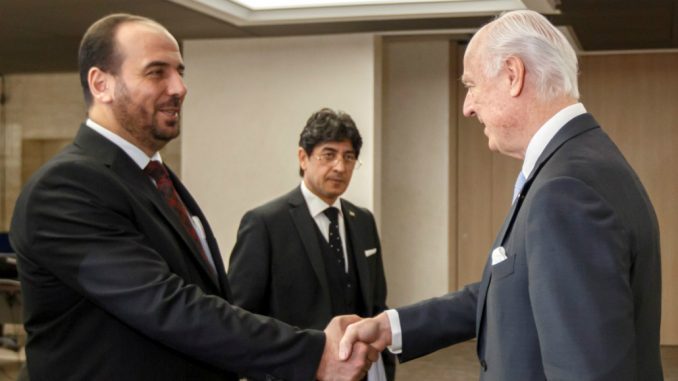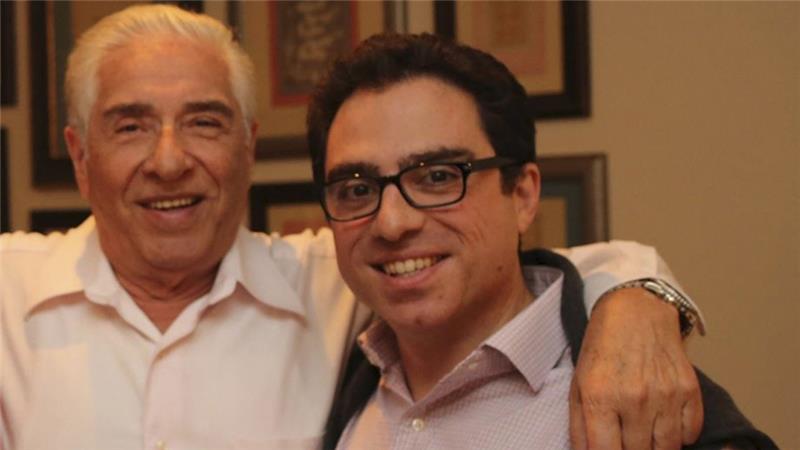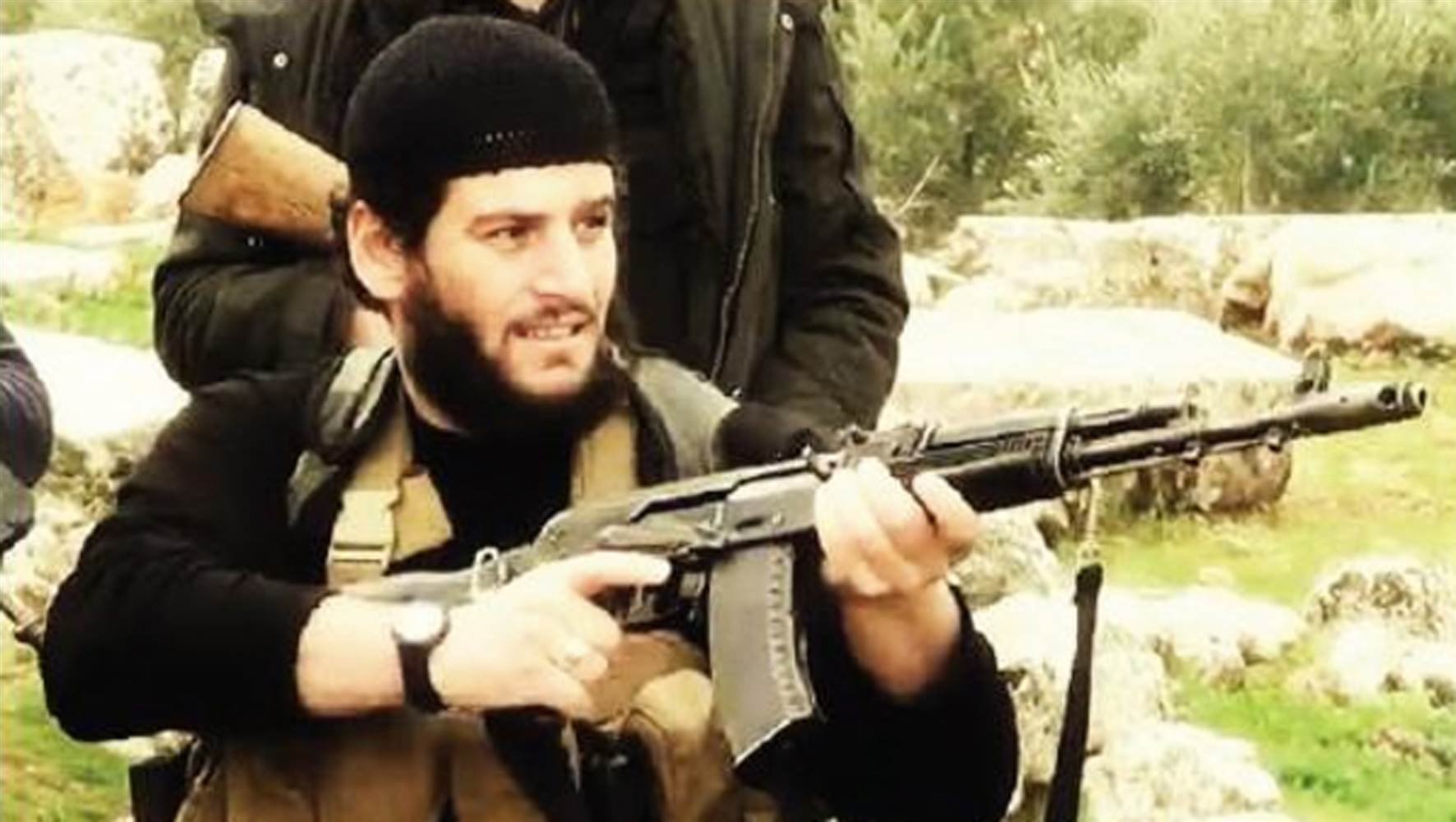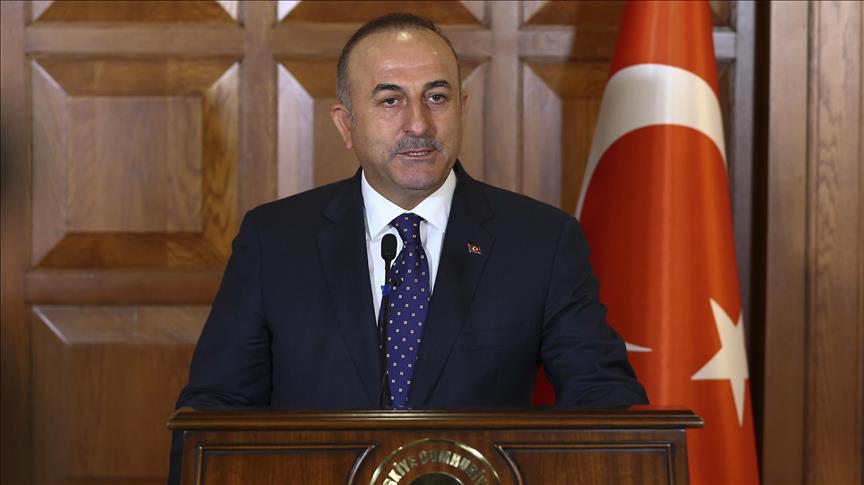
The Syrian opposition seems pessimistic and under pressure, after the latest peace talks ended without achieving its goals and the US changed its stance towards the Syrian crisis, making the opposition face hard challenges trying to find a solution for the crisis.
The third round of the Syrian peace talks in Geneva ended with an agenda that paves the way for the political transition, the opposition’s central goal – based on three subjects: accountable governance, a new constitution and UN-supervised elections within 18 months.
A fourth subject was added after pressure from Russia and Assad regime, which is fighting terrorism.
However, the fourth round of peace talks, which started on March 24, has been greatly affected since it started by the developments on the ground, and both sides traded blames and accused each other of backing terrorism and hindering the solution.
Were the talks progressive?
Both Assad regime’s delegation and opposition representatives had been “serious and engaged” during the latest nine days of talks in Geneva, UN mediator Staffan de Mistura told reporters.
He said all sides were “keen and ready to return to Geneva for a sixth round of talks,” adding that he would announce the date after discussions next week with UN chief Antonio Guterres and the UN Security Council.
The two sides, who met with de Mistura separately, did finally delve into some substance, after spending four previous rounds squabbling over the agenda.
They began discussing four separate “baskets” of issues, on governance, drafting a new constitution, elections and combating terrorism in the war-ravaged country.
De Mistura previously warned not to expect “miracles” and on Friday hailed the fact that no one had walked out. He acknowledged though that the talks still remained in the preparation stage.
“In every negotiation, there are certain issues that need to be prepared … before the real, real peace negotiations start … and it is clear, we are not quite there,” he said.
“I cannot deny that there are serious challenges, and I am not seeing immediately this developing into a peace agreement,” he added.
He insisted that “we must maintain this incremental momentum on the political process, even if it is only incremental.”
However, the opposition side didn’t share the same point of view with de Mistura.
A terrorist regime refusing any solution
Nasr al-Hariri, the chief negotiator for the opposition High Negotiations Committee (HNC), lamented to reporters that the opposition was dealing with “a side that does not want to reach a political solution.”
He said the “terrorist regime” of Bashar al-Assad had refused to discuss political transition during the talks and said Assad was a war criminal who must step down in the name of peace.
“They are solely discussing their empty rhetoric about countering terrorism,” Hariri told reporters, vowing there could be “no peace without justice.”
“War crimes and crimes against humanity must not be an option for negotiations. From now, venues must be found for transitional justice to ensure holding the perpetrators accountable,” he said.
In addition, he shouldered the regime the responsibility of “attracting terrorism” and reiterating that “the removal of Iranian and foreign militias was a prerequisite for the return of stability.”
Hariri said the opposition “was seeking to participate in Geneva to put an end to the suffering of the Syrians,” adding that Assad regime killed more than 1,000 civilians since February 23. “Accountability for crimes committed should not be a negotiating item.”
Change in Russian stance
Remarking on the Russian position vis-à-vis recent developments in Syria, al-Hariri pointed out that Moscow supported the Assad regime and had therefore contributed to a demographic change in Syria — while simultaneously claiming it supported a political process.
“These two factors contradict one another,” said al-Hariri. “On the ground, they are helping the regime and contributing to displacement and demographic change, while also claiming to support the political process.”
He added: “We hope to see a change in the Russian position.”
“Russia has not fulfilled any of its commitments to preserve the Syrian state and state institutions,” he went on to assert. “It continues to target civilians in opposition-held areas on the pretext of fighting terrorism.”
“Such policies won’t lead to a solution in Syria,” al-Hariri continued. “The Russians must support genuine political transition.”
Regarding a recent agreement for the evacuation of two regime-held towns in the Idlib countryside in return for lifting the siege on rebel-held areas near Damascus, al-Hariri said: “This is unacceptable. Handing over the western Damascus area to Shia militias could lead to the division of Syria.”
Such a move, he went on, “will only lead to further suffering and a humanitarian disaster when they [local residents] flee their homes and seek refuge in other areas.”
Syrian opposition facing the reality
In addition to the previous issues, a new turnover appeared after the US declared changing its stance regarding the peace talks.
The U.S. ambassador to the United Nations said that
The United States’ diplomatic policy on Syria, for now, is no longer focused on making Bashar al-Assad, leave power, in a departure from the Obama administration’s initial and public stance on Assad’s fate.
The view of the Trump administration is also at odds with European powers, who insist Assad must step down, and backed the Syrian opposition, at least with speeches, to achieve this goal.
Hariri said that the opposition delegation presented to the UN envoy to Syria Staffan de Mistura a vision of the political transition, reiterating the position of the opposition saying “we will only accept the departure of Assad, and will not rest until we put the perpetrators of crimes in Syria to justice.”
However, the US latest declarations put this demand under suspicion, as its support is needed against Russia’s influence and Assad regime’s manipulations.
Opposition figures reacted furiously to the US shift in stance.
“The opposition will never accept any role for Bashar al-Assad at any phase,” said Monzer Makhos, a spokesman for the High Negotiations Committee, which represents the opposition in negotiations over Syria’s war.
“There will be no change in our position,” he warned.
However, Farah al-Atassi, a Syrian opposition member, said that The U.S. State Department and the White House are sending contradictory messages on Syria and should start leading and not focus exclusively on fighting Islamic State.
Atassi told reporters in Geneva that the United States should put pressure on Russia and see the Syrian rebels as a reliable partner against terrorism, meaning not only Islamic State but also Iran-backed militias such as Hezbollah and the Iranian Revolutionary Guards.
Atassi said the Syrian opposition had had a very good meeting on Thursday with U.S. Middle East envoy Michael Ratney on the sidelines of peace talks in Geneva, and it had valued the United States as a partner and “ally” over the past six years.
But she said recent U.S. announcements were contradictory.
“We heard the spokesman for the White House contradict what Tillerson just stated today in Turkey. They clearly said Assad has no role in the transitional period. So it’s unfortunate that we are hearing such contradicting messages from the U.S. administration,” she said.
“We would like to see a more decisive role and leadership on the Syrian file, not to see the Syrian file only through the eyes of fighting ISIS.”
Atassi’s statement reflects that the Syrian opposition still believes in the US in solving the Syrian crisis, forgetting that it is the US who made Russia and Iran expand their influence over Syria’s present and future by failing to do its commitments to its “Syrian allies”.
“To suggest that Assad is an acceptable leader for the Syrian people is to ignore the wholesale slaughter of the Syrian people by the Assad regime. Leaving him in power is also a great reward for Russia and Iran,” a US senator said addressing the real situation.
The Syrian opposition should be aware of this fact too and be expecting the changes on the ground that these latest declarations will bring. Therefore, tough political games are waiting for the opposition in the coming peace talks, and the ability of opposition delegation to handle them and gather as many supporters and pressure cards as possible will have the greatest effect on deciding Syria’ future.



